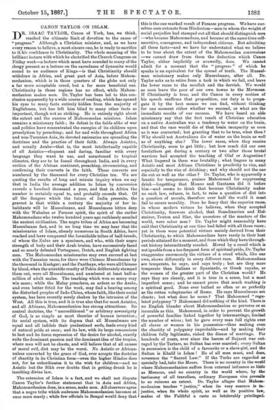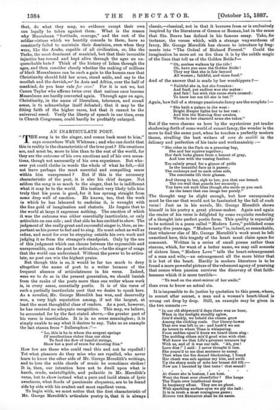CANON TAYLOR ON ISLAM.
DR. ISAAC TAYLOR, Canon of York, has, we think, reached the ultimate limit of devotion to the cause of 'progress." Although a Christian minister, and, as we have every reason to believe, a most sincere one, he is ready to sacrifice to it his confidence in Christianity. The whole meaning of the brilliant lecture with which he electrified the Church Congress on Friday week—a lecture which must have sounded to many of the clergy present as a lecture on the sacredness of dynamite would sound to an audience of Kings—is that Christianity should withdraw in Africa, and great part of Asia, before Mahom- medaniem, which is in those quarters of the globe not only a far more acceptable creed, but a far more beneficial one. Christianity in those regions has no effect, while Mahom- medanism makes men. Dr. Taylor has been led to this con- clusion apparently by a wide course of reading, which has opened his eyes to many facts entirely hidden from the majority of Englishmen, but has left him blind to many other facts as important, though not as striking. He is entirely right about the extent and the success of Mabommedan missions. Islam remains a missionary faith ; its defeat in the fields alike of war and politics have concentrated the energies of its children upon proselytism by preaching; and far and wide throughout Africa and non-Turanian Asia, its devoted emissaries are spreading the doctrines and the practice of their faith. Always Asiatics, and usually Arabs—that is, the most intellectually capable of all Asiatics—eloquent and daring, familiar with every language they want to use, and accustomed to tropical climates, they are to be found throughout India, and in every section of the African continent, preaching, circumcising, and confirming their converts in the faith. These converts are numbered by the thousand for every Christian ten. We are quoting the results of long and minute inquiry when we say that in India the average addition to Islam by conversion exceeds a hundred thousand a year, and that in Africa the number is certainly equal to, and probably exceeds that. Of all the dangers which the future of India presents, the gravest is that within a century the majority of her in- habitants will be Mussulmans, and Musulmans bitten deep with the Wahabee or Ferazee spirit, the spirit of the earlier Mahommedans who twelve hundred years ago ruthlessly assailed the ancient civilisation. The negro tribes of Africa are becoming hinesnlmans fast, and in no long time we may hear that the missionaries of Islam, already numerous in South Africa, have reached and have conquered the formidable tribes of half-breeds, of whom the Zulus are a specimen, and who, with their negro strength of body and their Arab brains, have successively faced and so nearly defeated Portuguese, Dutch, and English fighting men. The Mahommedan missionaries may even succeed at last with the Turanian races, for there were Chinese Mussulmans by the thousand in Kashgar; and the Panthaye, who were all Chinese by blood, when the scientific cruelty of Pekin deliberately stamped them out, were all Mussnlmans, and numbered at least balf-a- million of adult males. The teaching which won so many may win more; while the Malay preachers, as ardent as the Arabs, and even better fitted for the work, may find a hearing among the disturbed peoples of Indo-China, whose faith, like their social system, has been recently sorely shaken by the intrusion of the West. All this is true, and it is true also that for most Asiatics, and all Africans, Mahommedaniem has strong attractions. Its central doctrine, the " unconditioned " or arbitrary sovereignty of God, is as simple as most theories of human invention ; its social system, with its dogma that all Mussalmans are equal and all infidels their predestined serfs, feeds every kind of natural pride at once ; and its law, with its large concessions to lust and its fierce repression of the desire for alcohol, exactly suits the dominant passion and the dominant idea of the tropics, where men will not be chaste, and will believe that of all causes of moral evil, diet may be the worst. No Asiatic or African, unless converted by the grace of God, ever accepts the doctrine of chastity in its Christian form—even the higher Hindoo does not, for he subordinates it to the wish for children—and no Asiatic but the Sikh ever doubts that in getting drunk he is insulting divine law.
The extension of Islam is a fact, and we shall not dispute Canon Taylor's further statement that in Asia and Africa, Mahommedaniem does, inn sense, make men. All observers agree that a negro tribe which embraces Mahommedanism becomes at once more manly ; while few officials in Bengal would deny that this is the one marked result of Ferazee progress. We have our- selves seen outcasts from Hindooisra—men in whom the weight of social prejudice had stamped out all that should distinguish mew —who became Mahommedans, and became at the same time un- assertive, courageous, and independent citizens. But admitting all these facts—and we have far understated what we believe to be true about the extent of the Mahommedan conversions —we cannot draw from them the deduction which Canon Taylor, either implicitly or avowedly, does. We cannot admit for a moment that the " progress " of which be speaks is an equivalent for the spread of truth. The Masted- man missionary makes only littesulmans, after all. Dr. Taylor asks us to retire from a task in which we fail, and leave the lower races to the moollah and the dervish. We would as soon leave the poor of our own towns to the Mormons. If Christianity is true, and the Canon in every section of his speech reaffirms that proposition, our duty is to propa- gate it by the best means we can find, without thinking for one moment either whether we succeed, or what are the immediate results of our success. We have heard an able missionary say that the first result of Christian education on a native Australian was a tendency to water on the brain, and that the race would die of that brain incapacity as soon as it was converted; but granting that to be true, what then ? Why should not Australians die of water on the brain as well as of anything else ? The lower races, when they receive Christianity, seem to get little ; but how much did our own forefathers get during a century or two after those brutal warriors had accepted the teaching of Olaf or Augustine? What lingered in them was brutality ; what lingers in many Asiatic and most African Christians is proclivity to vice, and especially to the vice of drinking ; and why should not the one die out as well as the other ? Dr. Taylor, who is apparently a fanatic for temperance, praises hiahommed for suppressing drink—forgetting that Munoo and Gautama did it before him—and seems to think that because Christianity makes no such law, refuses, in fact, to raise a question of diet into a question of morals, therefore over half the world it must fail to secure morality. Does he fancy that the superior races, in whose modern virtues he believes, when they accepted Christianity, forswore alcohol, that Scandinavian and Hol- ateiner, Teuton and Slav, the ancestors of the masters of the world, were sober men ? Dr. Taylor might reasonably have said that Christianity at one time had failed with all these races; yet in them were potential virtues mainly derived, from their Christianity, to which Mahommedans have rarely in their beet periods attained for a moment, and from which they have through- out history intermittently receded. Moved by a recoil which is not ignoble from a too frequent form of spiritual pride, Dr. Taylor exaggerates enormously the virtues of a creed which, like our own, shows differently in every different race. Mahommedans are temperate, he says, and says truly ; but are they more temperate than Italians or Spaniards, or Greek rayahe, or the women of the greater part of the Christian world P He says they are cleanly, and it is true in a sense, but a most imperfect sense ; and he cannot prove that much washing is a spiritual good. None ever bathed so often or so perfectly as the rotten voluptuaries of Rome. He says Mnesulmans are chaste; but what does he mean That Mahommed " regu- lated polygamy"? Mahommed did nothing of the kind. There is no English blunder about Mahommedanism so perverse or so incurable as this. Mahommed, in order to prevent the growth of powerful families linked together by intermarriage, limited the number of wives ; but he gave every man full rights over all slaves or women in his possession—thus making even the chastity of polygamy improbable—and by making their children fully legitimate, risked the disuse of marriage. For hundreds of years, ever since the harem of Bajazet was out- raged by the Tartars, no Sultan has ever married; every Sultan in succession is the child of a favourite or a slave-girl, and the Sultan is Khalif in Islam ! He of all men must, and does, reverence the "Sacred Law." If the Tarks are regarded as specially bad, take the Moors. There is no country in the world where Mahommedaniem suffers from external influence so little as Morocco, and no country in the world where, by the testimony of all travellers, ordinary European vine prevails to so ruinous an extent Dr. Taylor alleges that Mahosi- medaniem teaches "justice," when its very essence is in- justice, when its whole spirit, as well as its positive law, makes of the Faithful a caste so intolerably privileged, that, do what they may, no evidence except their own can legally be taken against them. What is the reason why Masanlinen "fortitude, courage," and the rest of the soldier-virtues which we heartily concede to them, have so constantly failed to maintain their dominion, even when they were, like the Arabs, capable of all civilisation, or, like the Tarke, the most dominant of mankind, but that their incurable injustice has roused and kept alive through the ages an un- quenchable hate P Think of the history of Islam through the ages, and than consider closely whether the making of millions of black Mussulmans can be such a gain to the human race that Christianity should fold her arms, stand aside, and say to the moollah and the dervish,—' In Asia and Africa, over the half of mankind, do you bear rule for ever.' For it is not we, but Canon Taylor who affirms twice over that nations once become Massulman are hardly converted again. Through ages on ages, Christianity, in the name of liberalism, tolerance, and sound sense, is to acknowledge itself defeated ; that it may be the fitting faith of the higher races, but that it cannot be the universal creed. Verily the liberty of speech in our time, even in Church Congresses, could hardly be profitably enlarged.



































 Previous page
Previous page